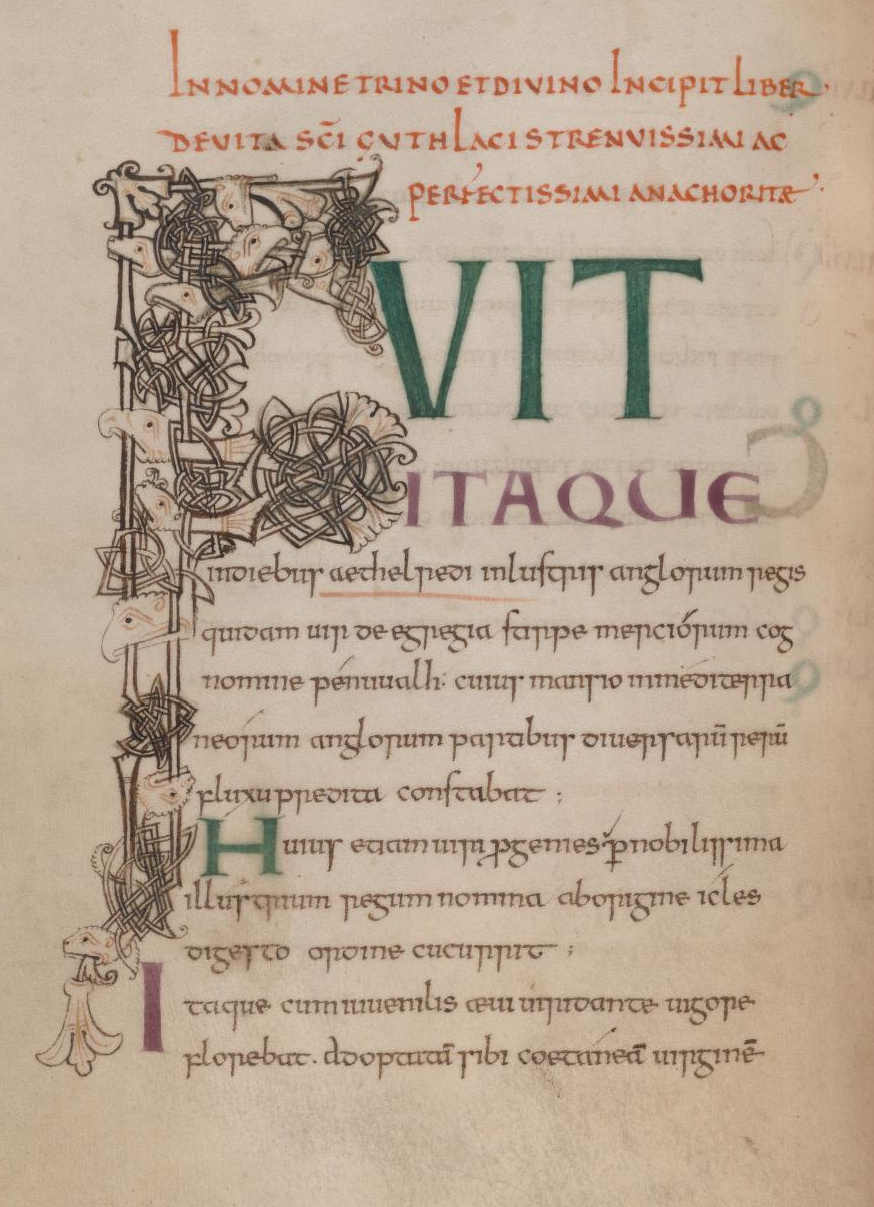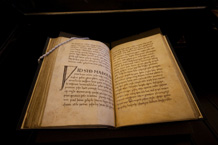|
Guthlac A
''Guthlac A'' and ''Guthlac B'' are a pair of Old English poems written in celebration of the deeds and death of Saint Guthlac of Croyland, a popular Mercian saint. The two poems are presented consecutively in the important Exeter Book miscellany of Old English poetry, the fourth and fifth items in the manuscript. They are clearly intended to be considered two items, judging from the scribe's use of large initials at the start of each poem. ''Guthlac A'' begins on 32v, and ''Guthlac B'' begins on 44v. The poems, like the majority of extant Old English poetry, are composed in alliterative verse. Summaries ''Guthlac A'' ''Guthlac A'' begins by reflecting on the transience of the goodness of creation, dwelling on the idea that humans are getting weaker in piety by the generation, and that those who uphold the laws of God are lessening in number. Furthermore, it is recognized as the tendency of the young man to forsake spirituality for earthly pursuits, while as an older man, he woul ... [...More Info...] [...Related Items...] OR: [Wikipedia] [Google] [Baidu] |
Old English
Old English ( or , or ), or Anglo-Saxon, is the earliest recorded form of the English language, spoken in England and southern and eastern Scotland in the Early Middle Ages. It developed from the languages brought to Great Britain by Anglo-Saxon settlers in the mid-5th century, and the first Old English literature dates from the mid-7th century. After the Norman Conquest of 1066, English was replaced for several centuries by Anglo-Norman language, Anglo-Norman (a langues d'oïl, type of French) as the language of the upper classes. This is regarded as marking the end of the Old English era, since during the subsequent period the English language was heavily influenced by Anglo-Norman, developing into what is now known as Middle English in England and Early Scots in Scotland. Old English developed from a set of Anglo-Frisian or Ingvaeonic dialects originally spoken by Germanic tribes traditionally known as the Angles (tribe), Angles, Saxons and Jutes. As the Germanic settlers ... [...More Info...] [...Related Items...] OR: [Wikipedia] [Google] [Baidu] |
Saint Guthlac
Saint Guthlac of Crowland (; ; 674714AD) was a Christian hermit and saint from Lincolnshire in England. He is particularly venerated in the Fens of eastern England. Hagiography Early life Guthlac was the son of Penwalh or Penwald, a noble of the English kingdom of Mercia, and his wife Tette. Guthlac's sister is venerated as St Pega. As a young man, Guthlac fought in the army of King Æthelred of Mercia (). He subsequently became a monk at Repton Abbey in Derbyshire at the age of 24, under the abbess there (Repton being a double monastery). Two years later he sought to live the life of a hermit, and moved out to the island of Croyland, now called Crowland (in present-day Lincolnshire), on St Bartholomew's Day, 699. His early biographer, Felix, writing in the early 8th century, asserts that Guthlac could understand the ('sibilant speech', that is "barbarous language") of Brittonic-speaking demons who haunted him there, only because Guthlac had spent some time in exile am ... [...More Info...] [...Related Items...] OR: [Wikipedia] [Google] [Baidu] |
Exeter Book
The Exeter Book, also known as the Codex Exoniensis or Exeter Cathedral Library MS 3501, is a large codex of Old English poetry, believed to have been produced in the late tenth century AD. It is one of the four major manuscripts of Old English poetry, along with the Vercelli Book in the chapter library of Vercelli Cathedral, Italy, the Nowell Codex in the British Library, and the Junius manuscript in the Bodleian Library in Oxford. The Exeter Book was given to what is now the Exeter Cathedral library by Leofric, the first bishop of Exeter, in 1072. It is believed to have originally contained 130 or 131 leaves, of which the first 7 or 8 have been replaced with other leaves; the original first 8 leaves are lost. The Exeter Book is the largest and perhaps oldest known manuscript of Old English literature, containing about a sixth of the Old English poetry that has survived. In 2016 UNESCO recognized the book as "the foundation volume of English literature, one of the wo ... [...More Info...] [...Related Items...] OR: [Wikipedia] [Google] [Baidu] |
Alliterative Verse
In meter (poetry), prosody, alliterative verse is a form of poetry, verse that uses alliteration as the principal device to indicate the underlying Metre (poetry), metrical structure, as opposed to other devices such as rhyme. The most commonly studied traditions of alliterative verse are those found in the oldest literature of the Germanic languages, where scholars use the term 'alliterative poetry' rather broadly to indicate a tradition which not only shares alliteration as its primary ornament but also certain metrical characteristics. The Old English language, Old English Epic poetry, epic ''Beowulf'', as well as most other Old English poetry, the Old High German ''Muspilli'', the Old Saxon ''Heliand'', the Old Norse language, Old Norse ''Poetic Edda'', and many Middle English poems such as ''Piers Plowman'', ''Sir Gawain and the Green Knight'', Layamon's Brut and the ''Alliterative Morte Arthur'' all use alliterative verse. While alliteration is common in many poetic traditio ... [...More Info...] [...Related Items...] OR: [Wikipedia] [Google] [Baidu] |
Saint Beccel
Bettelin of Crowland, also known as Beccel, was an 8th century hermit and saint of Crowland, and a follower of Guthlac. Biography Impressed by stories of his holiness, Bettelin traveled to be taught by Guthlac of Crowland, which at the time was in the kingdom of Mercia. Beccel served Guthlac fifteen years until his master's death in 714. A story is told however, that early in his tutelage he was afflicted with murderous thoughts against Guthlac, and he struggled to overcome them. In 714 he took advice from Guthlac, as Guthlac was dying and both he and Pega the sister of Guthlac, oversaw the burial of Guthlac. The event is recorded in the second poem of Guthlac, Felix's ''Life of Saint Guthlac'' and to a lesser extent the ''Anglo-Saxon Chronicle'' and the 15th century '' Historia Croylandensis''. Felix records that Beccel saw visions of light on the night before Guthlac died and at the time of his death. There is some speculation Beccel may have been a king turned hermit. Pa ... [...More Info...] [...Related Items...] OR: [Wikipedia] [Google] [Baidu] |
Cynewulf
Cynewulf (, ; also spelled Cynwulf or Kynewulf) is one of twelve Old English poets known by name, and one of four whose work is known to survive today. He presumably flourished in the 9th century, with possible dates extending into the late 8th and early 10th centuries. Cynewulf is a well-attested Anglo-Saxon given name derived from '' cyne'' "royal, of a king" and '' wulf'' "wolf". Known for his religious compositions, Cynewulf is regarded as one of the pre-eminent figures of Anglo-Saxon Christian poetry. Posterity knows of his name by means of runic signatures that are interwoven into the four poems which comprise his scholastically recognized corpus. These poems are: '' The Fates of the Apostles'', ''Juliana'', ''Elene'', and ''Christ II'' (also referred to as ''The Ascension''). The four signed poems of Cynewulf are vast in that they collectively comprise several thousand lines of verse. In comparison, the one work attributed to Cædmon, '' Cædmon's Hymn'', is quite ... [...More Info...] [...Related Items...] OR: [Wikipedia] [Google] [Baidu] |
Vita Sancti Guthlaci
Saint Guthlac of Crowland (; ; 674714AD) was a Christian hermit and saint from Lincolnshire in England. He is particularly venerated in the Fens of eastern England. Hagiography Early life Guthlac was the son of Penwalh or Penwald, a noble of the English kingdom of Mercia, and his wife Tette. Guthlac's sister is venerated as St Pega. As a young man, Guthlac fought in the army of King Æthelred of Mercia (). He subsequently became a monk at Repton Abbey in Derbyshire at the age of 24, under the abbess there (Repton being a double monastery). Two years later he sought to live the life of a hermit, and moved out to the island of Croyland, now called Crowland (in present-day Lincolnshire), on St Bartholomew's Day, 699. His early biographer, Felix, writing in the early 8th century, asserts that Guthlac could understand the ('sibilant speech', that is "barbarous language") of Brittonic-speaking demons who haunted him there, only because Guthlac had spent some time in exile am ... [...More Info...] [...Related Items...] OR: [Wikipedia] [Google] [Baidu] |
Cambridge University Press
Cambridge University Press was the university press of the University of Cambridge. Granted a letters patent by King Henry VIII in 1534, it was the oldest university press in the world. Cambridge University Press merged with Cambridge Assessment to form Cambridge University Press and Assessment under Queen Elizabeth II's approval in August 2021. With a global sales presence, publishing hubs, and offices in more than 40 countries, it published over 50,000 titles by authors from over 100 countries. Its publications include more than 420 academic journals, monographs, reference works, school and university textbooks, and English language teaching and learning publications. It also published Bibles, runs a bookshop in Cambridge, sells through Amazon, and has a conference venues business in Cambridge at the Pitt Building and the Sir Geoffrey Cass Sports and Social Centre. It also served as the King's Printer. Cambridge University Press, as part of the University of Cambridge, was a ... [...More Info...] [...Related Items...] OR: [Wikipedia] [Google] [Baidu] |
Jane Roberts (literary Scholar)
Jane Roberts, Society of Antiquaries of London, FSA, Fellow of the English Association, FEA, is a Northern Irish literary scholar. She was the Professor of English Language and Medieval Literature at King's College London from 1998 to 2001. Early life and education Jane Roberts was raised in Ballymena, Northern Ireland. After attending Cambridge House School, she read modern languages at Trinity College Dublin graduating in 1956, then completed a Diploma of Higher Education, diploma of higher education and an Master of Letters, MLitt in 1959 with a thesis on women in History of Anglo-Saxon England, Anglo-Saxon England. She then studied at St Hugh's College, Oxford, from 1959 to 1961; she was awarded a Doctor of Philosophy, DPhil in 1967.Louise Sylvester, Louise M. Sylvester and Christian Kay, Christian J. Kay, "Jane Roberts: A Personal Tribute", in Christian J. Kay and Louise M. Sylvester (eds), ''Lexis and Texts in Early English: Studies Presented to Jane Roberts'', Costerus New ... [...More Info...] [...Related Items...] OR: [Wikipedia] [Google] [Baidu] |





